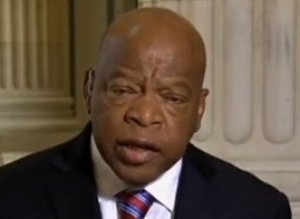Civil rights hero and longtime congressman John Lewis (D-Ga.) reacted in dismay to the Supreme Court's ruling striking down Section 4 of the Voting Rights Act on Tuesday.
Discussing the decision with ABC's Jeff Zeleny after it was announced, Lewis said the Supreme Court had "put a dagger in the heart of the Voting Rights Act."
In a 5-4 ruling, the court struck down the provision of the civil rights law that designates which parts of the country must have changes to their voting laws precleared by the Justice Department or a special federal court.
Lewis repeated his criticism of the court during an MSNBC appearance (video above), calling the decision a 'major step back."
"These men that voted to strip the Voting Rights Act of its power, they never stood in unmovable lines, they never had to pass a so-called literacy test," he said. "It took us almost 100 years to get where we are today. So will it take another 100 years to fix it, to change it?"
As a leader of the civil rights movement in the 1960s, Lewis played a key role in the push for voting rights protection. He revisited that history in an op-ed for The Washington Post:
On "Bloody Sunday," nearly 50 years ago, Hosea Williams and I led 600 peaceful, nonviolent protesters attempting to march from Selma to Montgomery to dramatize the need for voting rights protection in Alabama. As we crossed the Edmund Pettus Bridge, we were attacked by state troopers who tear-gassed, clubbed and whipped us and trampled us with horses. I was hit in the head with a nightstick and suffered a concussion on the bridge. Seventeen marchers were hospitalized that day.
In response, President Lyndon Johnson introduced the Voting Rights Act and later signed it into law. We have come a great distance since then, in large part thanks to the act, but efforts to undermine the voting power of minorities did not end after 1965. They still persist today.
Before Tuesday's ruling, Lewis had called the Supreme Court case "one of the most important cases in our generation."
At The Nation, reporter Ari Berman digs into Lewis' long fight for voting rights:
Lewis, now a thirteen-term congressman from Atlanta, was a leading participant in nearly all of the pivotal events of the civil rights movement -- the Nashville sit-ins, the Freedom Rides, the March on Washington, the Mississippi Freedom Summer. But his signature achievement is the VRA. Of all the surviving leaders of the movement, Lewis is most responsible for its passage and its overwhelming reauthorization four times by Congress. He is the soul of the voting rights movement and its most eloquent advocate. So many of his comrades from the civil rights years have died or drifted away, but Lewis remains as committed as ever to the fight to protect the right to vote. "I feel like it's part of my calling," he says.
For the full text of the Supreme Court ruling on the Voting Rights Act, click here.
Original Article
Source: huffingtonpost.com
Author: Melissa Jeltsen
Discussing the decision with ABC's Jeff Zeleny after it was announced, Lewis said the Supreme Court had "put a dagger in the heart of the Voting Rights Act."
In a 5-4 ruling, the court struck down the provision of the civil rights law that designates which parts of the country must have changes to their voting laws precleared by the Justice Department or a special federal court.
Lewis repeated his criticism of the court during an MSNBC appearance (video above), calling the decision a 'major step back."
"These men that voted to strip the Voting Rights Act of its power, they never stood in unmovable lines, they never had to pass a so-called literacy test," he said. "It took us almost 100 years to get where we are today. So will it take another 100 years to fix it, to change it?"
As a leader of the civil rights movement in the 1960s, Lewis played a key role in the push for voting rights protection. He revisited that history in an op-ed for The Washington Post:
On "Bloody Sunday," nearly 50 years ago, Hosea Williams and I led 600 peaceful, nonviolent protesters attempting to march from Selma to Montgomery to dramatize the need for voting rights protection in Alabama. As we crossed the Edmund Pettus Bridge, we were attacked by state troopers who tear-gassed, clubbed and whipped us and trampled us with horses. I was hit in the head with a nightstick and suffered a concussion on the bridge. Seventeen marchers were hospitalized that day.
In response, President Lyndon Johnson introduced the Voting Rights Act and later signed it into law. We have come a great distance since then, in large part thanks to the act, but efforts to undermine the voting power of minorities did not end after 1965. They still persist today.
Before Tuesday's ruling, Lewis had called the Supreme Court case "one of the most important cases in our generation."
At The Nation, reporter Ari Berman digs into Lewis' long fight for voting rights:
Lewis, now a thirteen-term congressman from Atlanta, was a leading participant in nearly all of the pivotal events of the civil rights movement -- the Nashville sit-ins, the Freedom Rides, the March on Washington, the Mississippi Freedom Summer. But his signature achievement is the VRA. Of all the surviving leaders of the movement, Lewis is most responsible for its passage and its overwhelming reauthorization four times by Congress. He is the soul of the voting rights movement and its most eloquent advocate. So many of his comrades from the civil rights years have died or drifted away, but Lewis remains as committed as ever to the fight to protect the right to vote. "I feel like it's part of my calling," he says.
For the full text of the Supreme Court ruling on the Voting Rights Act, click here.
Original Article
Source: huffingtonpost.com
Author: Melissa Jeltsen

No comments:
Post a Comment